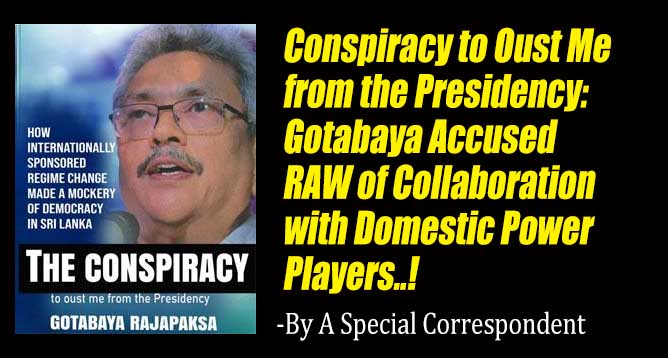-By A Special Correspondent

(Lanka-e-News -06.March.2024, 9.15 PM) The former President of Sri Lanka, Gotabaya Rajapaksa, recently unveiled a book on March 7th, 2024, shedding light on the purported conspiracy that led to his abrupt departure from the country in March 2022. In his book, Rajapaksa alleges that he was forced out of office by the Indian Research and Analysis Wing (RAW), in collusion with Sri Lankan politician Ranil Wickremesinghe, due to his inclination towards fostering closer ties with China.
Rajapaksa's decision to pen down his account of the events that transpired is met with scepticism by many, who attribute his downfall not to any external conspiracy but rather to his own failings as a leader. His presidency was marked by widespread public discontent, stemming from allegations of authoritarianism, corruption, and incompetence in governance. The revelation of millions discovered in his room upon his departure further fueled public outrage.
The Indian intelligence agency, RAW, has been accused by Rajapaksa of orchestrating protests against him, citing his administration's record of human rights abuses, corruption scandals such as the MIG fighter jet controversy, and alleged suppression of dissent, including the targeting of journalists and the establishment of paramilitary units to stifle opposition.
Critics of Rajapaksa argue that his tenure was characterized by his lack of experience and temperament unsuitable for high office. Despite his background as a former military officer involved in the country's civil war, Rajapaksa's ascent to power was largely facilitated by familial connections rather than merit. His stint in the United States, where he worked at a petrol station, hardly equipped him with the expertise required to effectively lead the nation's defence forces, yet he assumed the role of Defense Secretary under his brother's presidency in 2005.
In recent years, Sri Lanka has witnessed the emergence of Viyathmaga, an organization spearheaded by former President Gotabaya Rajapaksa. Launched with the purported aim of fostering intellectual discourse and driving socio-economic development, Viyathmaga has generated significant interest and controversy alike.
Viyathmaga, translated as "Path of the Learned," was founded by Gotabaya Rajapaksa in 2017, prior to his successful bid for the presidency in 2019. The organization positions itself as a platform for professionals, intellectuals, and entrepreneurs to contribute to the nation's progress through their expertise and ideas. Its objectives include promoting innovation, entrepreneurship, and good governance, ostensibly with the goal of advancing Sri Lanka's socio-economic landscape.
While Rajapaksa has claimed credit for ending the civil war in 2009, his detractors point to Field Marshal Sarath Fonseka's leadership in defeating the LTTE terrorist group. Furthermore, Rajapaksa's exploitation of the tragic Easter Sunday attacks in 2019, which claimed the lives of hundreds in coordinated bombings, served as a catalyst for his presidential bid later that year. However, his governance, reminiscent of a monarchy, failed to address the country's economic woes, resulting in widespread shortages of essential commodities such as fuel and medicine.
The economic crisis reached a tipping point in July 2022 when mass protests erupted across the country, with demonstrators occupying government buildings in Colombo. The Rajapaksa regime bore the brunt of public anger, accused of mismanagement, corruption, and exacerbating inflation. The once-adoring public, now grappling with food and fuel shortages, holds the Rajapaksas responsible for their plight. Gotabaya Rajapaksa returned to the country on Friday after a 52-day self-imposed exile, amidst the backdrop of the nation's worst-ever economic crisis. His return, marked by a warm reception from government officials, underscores the enduring influence he wields in the Indian Ocean nation, despite facing mounting criticism for his leadership.
Rajapaksa greeted with floral garlands upon disembarking from a commercial flight at the main international airport, was met by a welcoming party of ministers and politicians. The scene highlights the divisive nature of his legacy, with critics blaming him for steering the country into economic ruin, while supporters continue to rally behind him.
The former president fled Sri Lanka in mid-July under military escort, following widespread unrest and protests aimed at holding him accountable for the nation's unprecedented economic crisis. Unarmed crowds had stormed his official residence, signaling a dramatic turn of events for the once-powerful leader.
His resignation, sent from Singapore before his departure to Thailand, marked the end of his presidential immunity, leaving him vulnerable to potential legal repercussions. Rajapaksa's return, facilitated by his successor Ranil Wickremesinghe, has stirred controversy, with opposition politicians accusing Wickremesinghe of providing shelter to the Rajapaksa family.
Upon his return, Rajapaksa finds himself facing multiple charges, including his alleged involvement in the 2009 assassination of prominent newspaper editor Lasantha Wickrematunge. Rights activists have vowed to pursue legal action against him, both domestically and internationally, underscoring the challenges that lie ahead for the former president.
Despite the heightened security measures put in place to protect him, Rajapaksa's return comes at a time of deepening crisis for Sri Lanka. The country has been grappling with shortages of essential goods, lengthy power outages, and soaring inflation, exacerbated by a lack of foreign currency reserves and the economic fallout from the COVID-19 pandemic.
Rajapaksa's presidency, which began in 2019 with promises of prosperity and development, has been marred by accusations of mismanagement and corruption. His administration's policies, including unsustainable tax cuts and mounting government debt, have contributed to the country's current woes.
As Sri Lanka seeks to navigate its way out of the economic quagmire, Rajapaksa's return adds another layer of complexity to an already fraught political landscape. The international community will be closely watching developments in the country, as efforts to secure a much-needed bailout package from the International Monetary Fund signal a potential turning point in Sri Lanka's economic fortunes.
As Sri Lanka navigates through turbulent times, the legacy of Gotabaya Rajapaksa's presidency remains tarnished by allegations of incompetence and authoritarianism. Whether his account of a conspiracy orchestrated by foreign powers holds merit or not, the grievances of the Sri Lankan people against his administration serve as a stark reminder of the challenges facing the nation's political landscape.
---------------------------
by (2024-03-06 15:48:53)
Leave a Reply